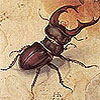|
A century after Robert Hooke's extraordinary treatise
introduced the microscopic world to an astonished public, the German polymath,
physician and keeper of the Margrave of Brandenburg's natural history
collection, Martin Frobenius Ledermüller (1719-1769), succeeded in
elaborating the potential of this emerging scientific art of popular microscopy.
Ledermüller produced a series of books in the second half of the eighteenth
century whose success was directly related to the visual quality of the
engravings made from his own drawings. Illustrations of previously invisible
material - fungi, plants, insects, plankton and crystals - were a great
commercial draw card in their own right of course. But Ledermüller augmented the
basic findings he recorded from his microscopic studies with a graphic
designer's aesthetic.
Specimens are arranged in the pictures to achieve an overall symmetry or
balanced appearance, the details are unnaturally precise and handcolouring
enhances the artistic effects. These attractive plates may not win any art show
prizes necessarily and the scientific content may not represent ground breaking
research per se, but Ledermüller (and similar early microscopists) occupies a
nonetheless important place in the history of science. These embellished visual
works - still informative and based in fact - served as a means by which the
esoteric world of science could be communicated to a fascinated lay audience. If
enthusiastic dilettantes failed to successfully visualise similar quality
details after dashing out to purchase their own microscope, well, it could only
be a matter of practice and modifying their techniques right?
Within the last two days, the formidable Strasbourg Universities Digital Library
uploaded a three volume work by Ledermüller. The selection of images above is
from the first two volumes (I've only just now discovered that the third is also
on line). About a quarter(?) of the available plates from the first two volumes
are shown. I think there are one hundred and fifty plates in total in the
series. The only adjustments I made were cropping and a slight reduction in size
(the large versions posted to flickr are still huge).
link |
